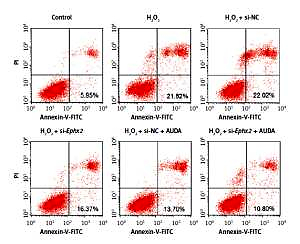Current issue
Archive
Manuscripts accepted
About the Journal
Editorial office
Editorial board
Section Editors
Abstracting and indexing
Subscription
Contact
Ethical standards and procedures
Most read articles
Instructions for authors
Article Processing Charge (APC)
Regulations of paying article processing charge (APC)
GENERAL SURGERY / BASIC RESEARCH
Soluble epoxide hydrolase (Ephx2) silencing attenuates the hydrogen peroxide-induced oxidative damage in IEC-6 cells
1
Department of Anorectal Surgery, First People’s Hospital of Yuhang District, Hangzhou, China
2
Anorectal Care Unit, First People’s Hospital of Yuhang District, Hangzhou, China
Submission date: 2018-04-04
Final revision date: 2018-07-13
Acceptance date: 2018-07-30
Online publication date: 2019-08-22
Publication date: 2021-07-16
Arch Med Sci 2021;17(4):1075-1086
KEYWORDS
TOPICS
ABSTRACT
Introduction:
Oxidative stress can cause intestinal disease. Soluble epoxide hydrolase (sEH, Ephx2) is related to cell apoptosis. The effect of Ephx2 on the H2O2-induced oxidative damage remains unclear. Thus, we aimed to explore the effect of Ephx2 on oxidative damage and the underlying potential mechanism.
Material and methods:
The cell viability was determined using cell counting kit-8 (CCK-8) assay. The reactive oxygen species (ROS), apoptosis, and mitochondrial membrane potential (MMP) were examined using flow cytometry analysis. Commercial kits were applied to respectively determine the lactate dehydrogenase (LDH) leakage, malondialdehyde (MDA) content, and superoxide dismutase (SOD) activity. The expressions of target factors were measured by conducting quantitative reverse transcription-polymerase chain reaction (qRT-PCR) and western blot.
Results:
We found that knockdown of Ephx2 enhanced the viability of H2O2-treated IEC-6 cells, and that si-Ephx2 reduced the ROS level, MMP loss, and apoptosis in comparison to the H2O2 model group. Knockdown of Ephx2 was found to decrease LDH activity and MDA content, and to improve the SOD activity in comparison to those in the H2O2 model group. Knockdown of Ephx2 reduced the expressions of Fas, Fasl, Bax, and cleavedcaspase-3 and elevated the expression of Bcl-2 in H2O2-treated IEC-6 cells. Furthermore, we observed that knockdown of Ephx2 enhanced the phosphorylation of PI3K, Akt, and GSK3, which were reduced by the treatment of H2O2. In addition, the anti-apoptotic effect of si-Ephx2 was enhanced in the presence of AUDA-pharmacological Ephx2 inhibitor.
Conclusions:
Ephx2 silencing inhibited H2O2-induced oxidative damage. The PI3K/Akt/GSK3 pathway was related to the effect of si-Ephx2. Our study provided a potential target for the prevention of intestinal injury.
Oxidative stress can cause intestinal disease. Soluble epoxide hydrolase (sEH, Ephx2) is related to cell apoptosis. The effect of Ephx2 on the H2O2-induced oxidative damage remains unclear. Thus, we aimed to explore the effect of Ephx2 on oxidative damage and the underlying potential mechanism.
Material and methods:
The cell viability was determined using cell counting kit-8 (CCK-8) assay. The reactive oxygen species (ROS), apoptosis, and mitochondrial membrane potential (MMP) were examined using flow cytometry analysis. Commercial kits were applied to respectively determine the lactate dehydrogenase (LDH) leakage, malondialdehyde (MDA) content, and superoxide dismutase (SOD) activity. The expressions of target factors were measured by conducting quantitative reverse transcription-polymerase chain reaction (qRT-PCR) and western blot.
Results:
We found that knockdown of Ephx2 enhanced the viability of H2O2-treated IEC-6 cells, and that si-Ephx2 reduced the ROS level, MMP loss, and apoptosis in comparison to the H2O2 model group. Knockdown of Ephx2 was found to decrease LDH activity and MDA content, and to improve the SOD activity in comparison to those in the H2O2 model group. Knockdown of Ephx2 reduced the expressions of Fas, Fasl, Bax, and cleavedcaspase-3 and elevated the expression of Bcl-2 in H2O2-treated IEC-6 cells. Furthermore, we observed that knockdown of Ephx2 enhanced the phosphorylation of PI3K, Akt, and GSK3, which were reduced by the treatment of H2O2. In addition, the anti-apoptotic effect of si-Ephx2 was enhanced in the presence of AUDA-pharmacological Ephx2 inhibitor.
Conclusions:
Ephx2 silencing inhibited H2O2-induced oxidative damage. The PI3K/Akt/GSK3 pathway was related to the effect of si-Ephx2. Our study provided a potential target for the prevention of intestinal injury.
Share
RELATED ARTICLE
We process personal data collected when visiting the website. The function of obtaining information about users and their behavior is carried out by voluntarily entered information in forms and saving cookies in end devices. Data, including cookies, are used to provide services, improve the user experience and to analyze the traffic in accordance with the Privacy policy. Data are also collected and processed by Google Analytics tool (more).
You can change cookies settings in your browser. Restricted use of cookies in the browser configuration may affect some functionalities of the website.
You can change cookies settings in your browser. Restricted use of cookies in the browser configuration may affect some functionalities of the website.



